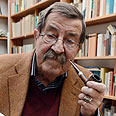
Part-time anti-Semites
Op-ed: Grass affair revealed the nature of most contemporary European anti-Semites
That Grass’ poem is anti-Semitic is not difficult to prove. One only has to place it next to the European Union’s definition of anti-Semitism to see that. Yet focusing on the hate poem’s content and on the many criticisms of it leaves a number of other substantial issues in the shadows.
One of the main items of the public debate was whether Grass is an anti-Semite. This misses the point. In contemporary Western societies, mainly neo-Nazis and a substantial number of Muslims are full-time anti-Semites. The predominant type of European anti-Semite is the part-time one. It is a typical expression of contemporary society in which structures, attitudes and opinions have fragmented and many personalities are split.
Grass is a part-time anti-Semite. He demonizes Israel, yet claims in his poem that he’s a friend of Israel. However false that claim is, no full-time anti-Semite would take the trouble to say it.
It is also important to observe who supports or whitewashes Grass – the poet who called Israel a danger to world peace. The enthusiasm shown by Iranian Deputy Minister Dschawad Schamadari for Grass is revealing. Perhaps Grass’ most prominent whitewasher is Sigmar Gabriel, Chairman of the German Social Democrat Party. He called the attacks on Grass “exaggerated” and partly “hysterical.”
Flawed Israeli reaction
Gabriel said that the poem was a permissible expression of “opinion.” He should have more accurately stated: “of incitement.” Gabriel added that Grass is not an anti-Semite. He then expressly stated that the SPD would continue to appreciate the support of Grass in future elections.
A few weeks earlier, Gabriel had accused Israel of apartheid policies. After much criticism leveled against him, he said that he only mentioned that it took place in Hebron. The SPD chairman has stated falsely that he is a friend of Israel. If this were true, he would have asked the German government to bring Iran before an International Court long ago due to its breach of the United Nations Genocide Convention, as Iranian leaders wish to eradicate Israel.
Germany is a signatory of this convention and the Social Democrats were a partner in the coalition government until 2009. The Grass affair thus helps us unmask Gabriel as a hypocrite even further.
Much can also be learned by looking at Israel’s reactions to Grass’ poem. Why did Prime Minister Netanyahu get involved with a poem, however ugly? Why did Foreign Minister Avigdor Lieberman do so also? Why did Minister of Interior Eli Yishai declare Grass persona non grata? The poet had not announced any intention to visit Israel. Israel does not usually declare which ones of its many haters will be allowed entry.
Grass thereupon compared Minister Yishai to former DDR Minister Erich Mielke, who was head of the Stasi Secret service. If Yishai had competent advisers, they could have told him in advance that a politician cannot win a shouting match with an author who can say the most absurd things. The Israeli travel ban also enabled other German politicians to criticize Israel without risking accusations of whitewashing the anti-Semitic poem.
The Israeli government’s reactions illustrated once again the helplessness of the authorities in the propaganda war against the country. Not having analyzed it, nor having understood it, the authorities produce only ad hoc reactions to each new incident.
If there had to be any Israeli reaction at all, it should have been made by a low official who could have said: “When it was fashionable, Grass was a Nazi. When that became objectionable, he hid his past. He revealed it only late in his life, when little harm could be done to him. When it became fashionable to demonize Israel, he published his lies in poetry form.”
Finally there is the question - why did five major European papers publish an anti-Semitic poem? One must mention that the Italian Repubblica did so, yet published critical articles next to it. The answer to this seems simple because the German Suddeutsche Zeitung, the Spanish El Pais, the British The Guardian and the Danish Politiken are not contemporary mutations of the Nazi paper Der Stürmer. Like Grass, who is a part-time anti-Semitic poet, they are part-time anti-Semitic publications.
Dr. Manfred Gerstenfeld has published 20 books. Several of these address anti-Israelism and anti-Semitism










